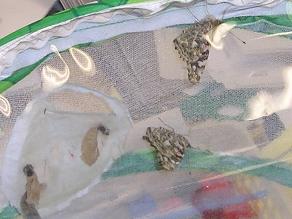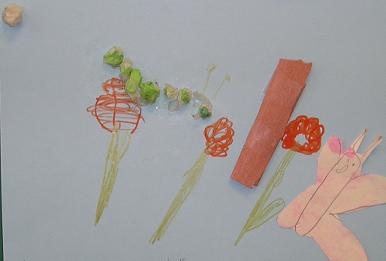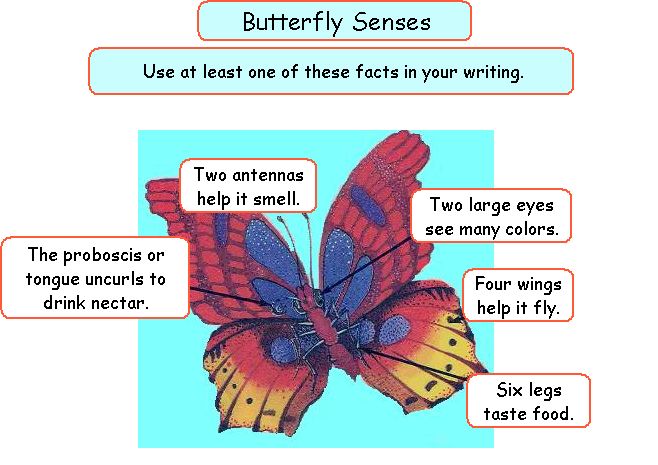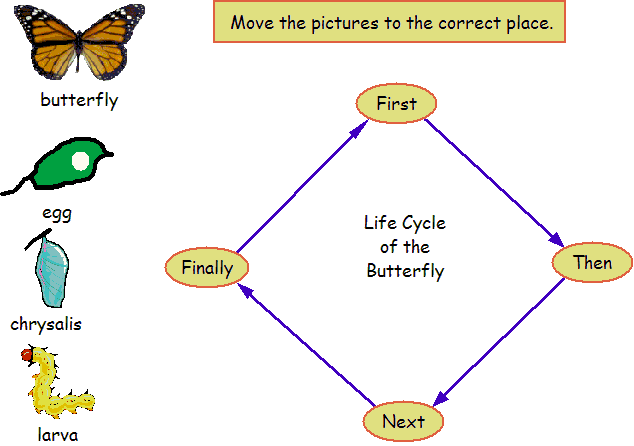|
Each spring,
my class studies butterfly metamorphosis. Students look forward
to learning more about how caterpillars "change" into
butterflies. This year, we began our study months ago when we
learned about animals and insects. We knew that insects have six
legs and some can fly. But we wondered about what really happens
inside the butterfly chrysalis. Was the caterpillar changing or
switching body parts to look like a butterfly?
After
reading several books and viewing some interesting videos and
websites about butterflies, our larvae arrived by mail around
Memorial Day. We kept a log to record their growth and how they
seemed to change. We measured the caterpillars with a centimeter
ruler. Two of them never got to the top of the jar before the
chrysalis started to show. We wondered if they would be able to
complete the metamorphosis without hanging. They made it just
fine! All 5 of our larvae became pretty butterflies!

This is a
picture of the first two to emerge. We loved watching them fly
away when we opened the cage outside. One butterfly landed on
Bridget's sleeve for a little while!

Most of my
students chose to make a model with paper scraps.
Tyler's
Picture

Matthew's
Picture

Maddy drew a
picture:

All of the
children chose to do a creative writing piece after reading
Aileen Fisher�s poem, Butterfly Wings (listed in resources).
They all imagined a pretend butterfly traveling somewhere. A few
acted this out as part of our prewriting brainstorm. This was
lots of fun! Butterflies were colored with crayons and scanned
to use on computer. Then they planned their writing using folded
paper (4 square style). A graphic organizer made with
Kidspiration showing butterfly senses was printed and given to
each student as a resource to use with their writing:

All of the
students inserted their scanned illustration into a Power Point
slide. We used MaxShow from
Scholastic Keys and added a title using Word Art. Some
students also made illustrations in PAINT and added those images
to their slides too. The teacher typed in story text (we were in
a rush to finish before school ended!). MaxShow has a talking
interface that reads the text on a page. This was helpful for
students who needed this extra support while reading their
classmates� pages. Others turned it on just because they thought
it was fun to watch a parrot read the pages!
Take a look
at some of our PowerPoint
slides.
All of the
other written work done by the class (including a whole class
diamante poem) can be viewed on our website:
Butterfly Wings
http://www.mrsmcgowan.com/projects/butterflies/index.html
Their
finished writing also was printed and displayed in the hallway
to share with our school community. A final assessment was done
with each student using a
Kidspiration template. Once again, the talking interface was
available. This is a very simple drag and drop activity that
shows how alternative assessment can be done on the computer.
I�m excited to utilize this kind of assessment with other topics
throughout our curriculum.

Click
HERE to download
this Kidspiration file.
Resources:
Books:
I Wish I Were A
Butterfly
by James Howe
Where Butterflies
Grow
by Joanne Ryder
Where Does the
Butterfly Go When It Rains?
by May Garelick
I'm A Caterpillar
by Jean Marzollo
Poem:
Butterfly Wings
How would
it be
on a day in June
to open your eyes
in a dark cocoon,
And soften
one end
and crawl outside,
and find you had wings
to open wide,
And find you could fly
to a bush or tree
or float on the air
like a boat at sea . . .
How would it BE?
�Aileen Fisher
Videos:
Magic School
bus - Butterflies
Eye Witness
- Butterflies & Moths
Websites:
How does a
caterpillar turn into a butterfly? This is not easy to explain.
One could say that inside the chrysalis the caterpillar changes
clothes and turns into a butterfly. Actually, what happens is
that the caterpillar structures are broken down chemically and
the adult�s new structures are formed. To be more blunt, the
solids of the caterpillar completely liquify and then form the
new solid structures of the butterfly.
* Butterflies in NJ
http://www.npwrc.usgs.gov/resource/distr/lepid/bflyusa/nj/toc.htm
*
A Dance With the
Butterflies - Curriculum Materials
http://www.comsewogue.k12.ny.us/~ssilverman/butterflies/resources.htm
|